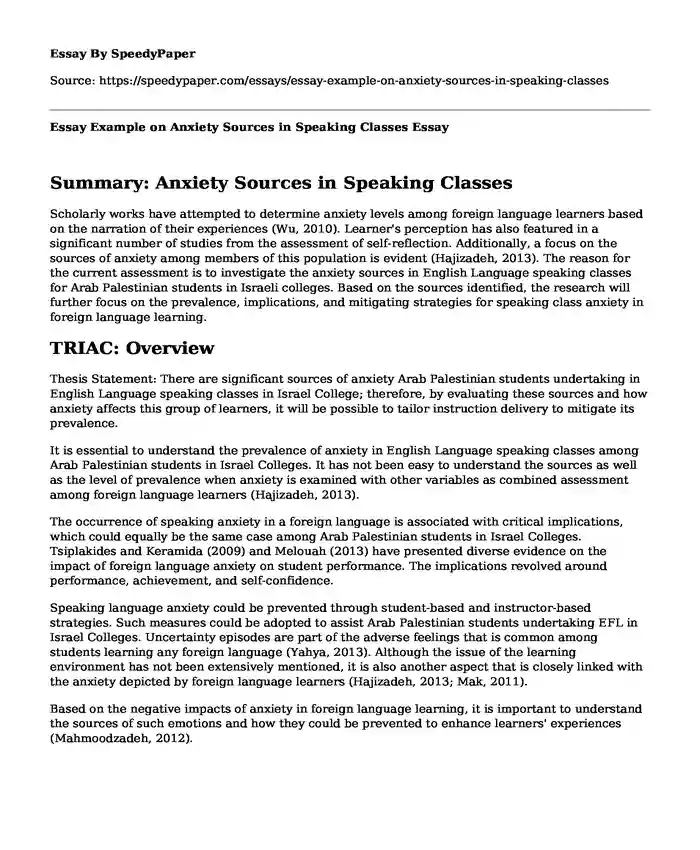
| Type of paper: | Essay |
| Categories: | Education Psychology |
| Pages: | 3 |
| Wordcount: | 629 words |
Summary: Anxiety Sources in Speaking Classes
Scholarly works have attempted to determine anxiety levels among foreign language learners based on the narration of their experiences (Wu, 2010). Learner's perception has also featured in a significant number of studies from the assessment of self-reflection. Additionally, a focus on the sources of anxiety among members of this population is evident (Hajizadeh, 2013). The reason for the current assessment is to investigate the anxiety sources in English Language speaking classes for Arab Palestinian students in Israeli colleges. Based on the sources identified, the research will further focus on the prevalence, implications, and mitigating strategies for speaking class anxiety in foreign language learning.
TRIAC: Overview
Thesis Statement: There are significant sources of anxiety Arab Palestinian students undertaking in English Language speaking classes in Israel College; therefore, by evaluating these sources and how anxiety affects this group of learners, it will be possible to tailor instruction delivery to mitigate its prevalence.
It is essential to understand the prevalence of anxiety in English Language speaking classes among Arab Palestinian students in Israel Colleges. It has not been easy to understand the sources as well as the level of prevalence when anxiety is examined with other variables as combined assessment among foreign language learners (Hajizadeh, 2013).
The occurrence of speaking anxiety in a foreign language is associated with critical implications, which could equally be the same case among Arab Palestinian students in Israel Colleges. Tsiplakides and Keramida (2009) and Melouah (2013) have presented diverse evidence on the impact of foreign language anxiety on student performance. The implications revolved around performance, achievement, and self-confidence.
Speaking language anxiety could be prevented through student-based and instructor-based strategies. Such measures could be adopted to assist Arab Palestinian students undertaking EFL in Israel Colleges. Uncertainty episodes are part of the adverse feelings that is common among students learning any foreign language (Yahya, 2013). Although the issue of the learning environment has not been extensively mentioned, it is also another aspect that is closely linked with the anxiety depicted by foreign language learners (Hajizadeh, 2013; Mak, 2011).
Based on the negative impacts of anxiety in foreign language learning, it is important to understand the sources of such emotions and how they could be prevented to enhance learners' experiences (Mahmoodzadeh, 2012).
Reason for Choosing this Topic
Foreign language learners occasionally come across encounters that facilitate the development of tension and worries (Woodrow, 2006). An understanding of the sources of anxiety among foreign language learners ensures that the teaching process is designed to accommodate diversity and prevent the prevalence of anxiety. This research focuses on the Arab Palestinian learners in Israeli colleges, which implies that it will be possible to accommodate the needs of this group when teaching, assessing, and engaging them in EFL speaking classes.
References
Hajizadeh, A. (2013). Investigating Iranian university students' perception of foreign language anxiety. Doctoral dissertation, Eastern Mediterranean University (EMU)- Dogu Akdeniz Universitesi (DAU).
Mahmoodzadeh, M. (2012). Investigating Foreign Language Speaking Anxiety within the EFL Learner's Interlanguage System. The Case of Iranian Learners. Journal of Language Teaching & Research, 3(3), 1 - 16. DOI: 10.4304/jltr.3.3.466-476
Mak, B. (2011). An exploration of speaking-in-class anxiety with Chinese ESL learners. System, 39(2), 202-214. DOI: 10.1016/j.system.2011.04.002
Melouah, A. (2013). Foreign Language Anxiety in EFL speaking classrooms: A case study of first-year LMD students of English at the Saad Dahlab University of Blida, Algeria. Arab World English Journal, 4(1), 64-76. https://awej.org/index.php/volume-4-2013/32-awej-volume-4-number-1-2013/182-asma-melouah
Tsiplakides, I., & Keramida, A. (2009). Helping students overcome foreign Language Speaking Anxiety in the English Classroom: Theoretical Issues and Practical Recommendations. International Education Studies,2(4), 39-44. DOI: 10.5539/ies.v2n4p39
Woodrow, L. (2006). Anxiety and speaking English as a second language. RELC Journal, 37(3),308-328. DOI: 10.1177/0033688206071315.
Wu, K. (2010). The relationship between language learners' anxiety and learning strategy in CLT classrooms. International Education Studies, 3(1), 174. https://files.eric.ed.gov/fulltext/EJ1066074.pdf
Cite this page
Essay Example on Anxiety Sources in Speaking Classes. (2023, May 14). Retrieved from https://speedypaper.net/essays/essay-example-on-anxiety-sources-in-speaking-classes
Request Removal
If you are the original author of this essay and no longer wish to have it published on the SpeedyPaper website, please click below to request its removal:
- Free Essay on How Does the Environment Affect Human Behavior
- Essay Sample on Cognitive Influences in Social Contexts
- Admission Essay Sample: University of Pennsylvania Writing Supplement
- MPH in Health Policy and Management
- Essay Sample Dedicated to the Use of N-word and the Language Effect: Power and Politeness
- Paper Example. Review of Research Articles
- Creating an Inclusive Classroom: Prioritizing Students Over Disabilities - Essay Sample
Popular categories




